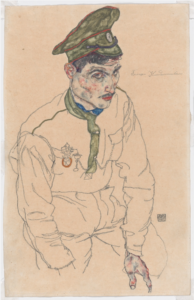The Art Institute of Chicago is putting up a fight regarding an Egon Schiele drawing that the Nazis possibly looted.
The museum has been one of the targets of the Manhattan DA’s office for some time now. The Art Institute, along with several other museums, has a drawing by the Austrian expressionist artist Egon Schiele, which the Manhattan DA’s office says was illegally taken by the Nazis from the collection of Austrian Jewish actor Fritz Grünbaum. The other museums have complied with the requests, while the Art Institute remains steadfast. When the DA’s office initially moved to confiscate the drawing in September, the museum put out a statement claiming they are “confident in our legal acquisition and lawful possession of this work.”
Seven months after the DA’s office made their initial move to seize the Schiele work, a drawing called Russian War Prisoner, the museum submitted a court filing claiming that there is no evidence whatsoever that the work in their possession was ever looted or stolen. This was a response to a filing the Manhattan DA’s office submitted in February, claiming that the Art Institute is actively ignoring the evidence that the Nazis stole the drawing. According to the facts, the Nazis imprisoned Fritz Grünbaum at Dachau, where he signed power of attorney over to his wife, who was then forced to surrender her husband’s collection. Authorities put the collection in a warehouse controlled by Schenker & Co., a logistics firm with extensive ties to the Nazi regime.
The Art Institute, however, claims that Russian War Prisoner passed legally from Grünbaum to his sister-in-law, who then sold it in 1956 to Swiss art dealer Eberhard Kornfeld. This was not the only work from Grünbaum’s collection that passed through Kornfeld’s hands. To buy into the Art Institute’s version of events, one has to believe Kornfeld’s story since he is the one who claimed that he bought the drawing from Grünbaum’s sister-in-law. The Manhattan DA’s office, however, is incredibly skeptical. In fact, their confiscation of stolen Schiele works is part of a larger investigation into Kornfeld and the gallerist Otto Kallir. Evidence suggests that the two of them sometimes dealt in artworks with tainted provenances, laundering the art by altering or covering up details. The DA’s office has pointed out that the provenance documents related to Russian War Prisoner contain alterations and forged signatures.
Furthermore, to bolster their claim, the Art Institute asserts that Schenker & Co. was a private company rather than a state-run organization, meaning that technically the Schiele was not taken by the Nazi government. And then there’s probably the boldest claim of them all, that Grünbaum had legally handed over power of attorney without any coercion. But of course, given that he was in a concentration camp, where he would end up dying in 1941, it would be an act of astonishing obstinacy to reject the reality that Grünbaum clearly had his assets taken from him under the guise of legality. In dealing with looted works previously in Grünbaum’s collection, a ruling from the New York State Court of Appeals states, “We reject the notion that a person who signs a power of attorney in a death camp can be said to have executed the document voluntarily.” Though there wasn’t a literal gun to his head, Grünbaum’s circumstances would nullify any legal action he took.
Many museums have already complied with the Manhattan DA’s requests, including the Museum of Modern Art, the Morgan Library, the Santa Barbara Museum of Art, the Carnegie Museums, the Allen Memorial Art Museum, and several private collectors. In reality, most visitors to the Art Institute are not there to see any of Schiele’s works. They visit to see works by Grant Wood and Edward Hopper or to stand in front of A Sunday Afternoon on the Island of La Grande Jatte by Georges Seurat to reenact scenes from Ferris Bueller’s Day Off. It’s interesting to speculate on why the Art Institute would make such a scene over one drawing, which is not even on display. The simplest and most likely answer is because of pride. It can be difficult to admit when you’re wrong, or you got fooled. However, sensitive topics like Holocaust loot are not the time to put on a brave face or stand defiant; nor come to the defense of the people who may have tricked you.

